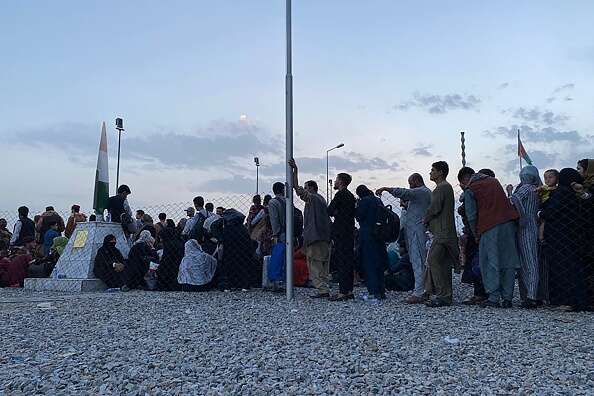
The Committee to Protect Journalists is receiving hundreds of “SOS emails” a day from Afghans attempting to flee the Taliban, Press Gazette has been told.
Maria Salazar-Ferro, emergencies director at the CPJ, has told how Afghan journalists are “scrubbing their social media” as they attempt to avoid the attentions of the Taliban.
High-profile reporters, meanwhile, are receiving death threats as they attempt to escape the country.
“Some of them… are saying that they are receiving active threats from the Taliban that essentially say: ‘Your time is up,’” Salazar-Ferro told Press Gazette on Thursday.
“And in several cases we have heard that alleged Taliban personnel, fighters, have shown up to their houses searching for them – or to family houses searching for them. So it seems like the threat in some cases is active and is increasing.
“Other people are generally saying they’re afraid for their lives, they’re afraid that the work that they did will put them at risk.”
Since this conversation, news has broken that a relative of a journalist at German broadcaster Deutsche Welle had been killed by the Taliban and another seriously injured. Other relatives of the journalist, who is currently working in Germany, managed to escape and have been forced to go on the run.
Deutsche Welle director general Peter Limbourg said: “The killing of a close relative of one of our editors by the Taliban yesterday is inconceivably tragic, and testifies to the acute danger in which all our employees and their families in Afghanistan find themselves. It is evident that the Taliban are already carrying out organised searches for journalists, both in Kabul and in the provinces. We are running out of time.”
Click here to subscribe to Press Gazette’s must-read newsletters, Future of Media and Future of Media US |
Salazar-Ferro said that the journalists receiving threats generally have high profiles in the Afghan media.
“We’ve also heard from folks who are saying they’re scrubbing their social media and are trying to clean up whatever is out there that could link them to journalism to decrease the threat against them. But the folks we know to have received threats are public personalities – whether it’s radio, broadcast or print.”
As of Thursday afternoon (East Coast Time, US), Salazar-Ferro said the CPJ had received around 2,000 requests for help. She added, though, that not all of these pleas have come from journalists – “I think there is just information circulating about who might be able to help.
“So the first thing we have to do is make sure that we are in touch with a journalist and then we get in touch with them and try to understand what their situation is – who they worked for and how we could help them. This takes quite a bit of time.”
She said the CPJ currently has six people checking cases. Their workload is growing fast.
“In one evening, we’ll receive between 400 and 500 SOS emails. So we have a team of researchers who are going through the requests and contacting people who are reaching out.”
So far, the CPJ has been able to verify the cases of around 300 people. The process of helping Afghan journalists is “quite chaotic”, Salazar-Ferro added.
“The difficulties are many,” she said. “They begin from the time that the journalist tries to leave their home, or wherever they are right now.
“Their way to the airport is spotted with Taliban checkpoints and anecdotally we have heard that the Taliban is unwilling to let Afghans leave or is asking for bribes in order to let folks through. I have not reported on this, I can’t confirm whether this is true – these are just anecdotes we are hearing.
“Once they get to the airport, there is a lot of confusion as to which gates are open, what gates are functional. There are Taliban checkpoints outside the airport and even once they make it to the appropriate gate, it’s quite difficult to get them through the gate and get them into the airport that’s controlled by the US and NATO.”
The situation for Afghan journalists is changing hour by hour. On Wednesday evening (US time), the New York Times announced that 128 of its current and former Afghan employees and their family members had reached safety.
The Washington Post said that a group of 13 of its employees, including Afghan journalists and their families, had safely departed Kabul on Tuesday.
The Wall Street Journal said in a statement on Thursday that “there has been positive progress and our colleagues are on their way to safe passage. We will have more to share soon.”
This week, after the Taliban took over the capital city of Kabul on Sunday, 11 UK news groups co-signed a letter to the British government asking it to take action to save Afghan colleagues trapped in the country.
The US-headquartered CPJ is working with governments across the world to help Afghan journalists. It wants to US government to facilitate safe passage out of the country for Afghan journalists and provide them with emergency visas.
Photo: Afghan people queue up to board a US military aircraft to leave Afghanistan, at the military airport in Kabul on August 19, 2021 after Taliban’s military takeover of Afghanistan. (Photo by Shakib RAHMANI / AFP) (Photo by SHAKIB RAHMANI/AFP via Getty Images)
Email pged@pressgazette.co.uk to point out mistakes, provide story tips or send in a letter for publication on our "Letters Page" blog






